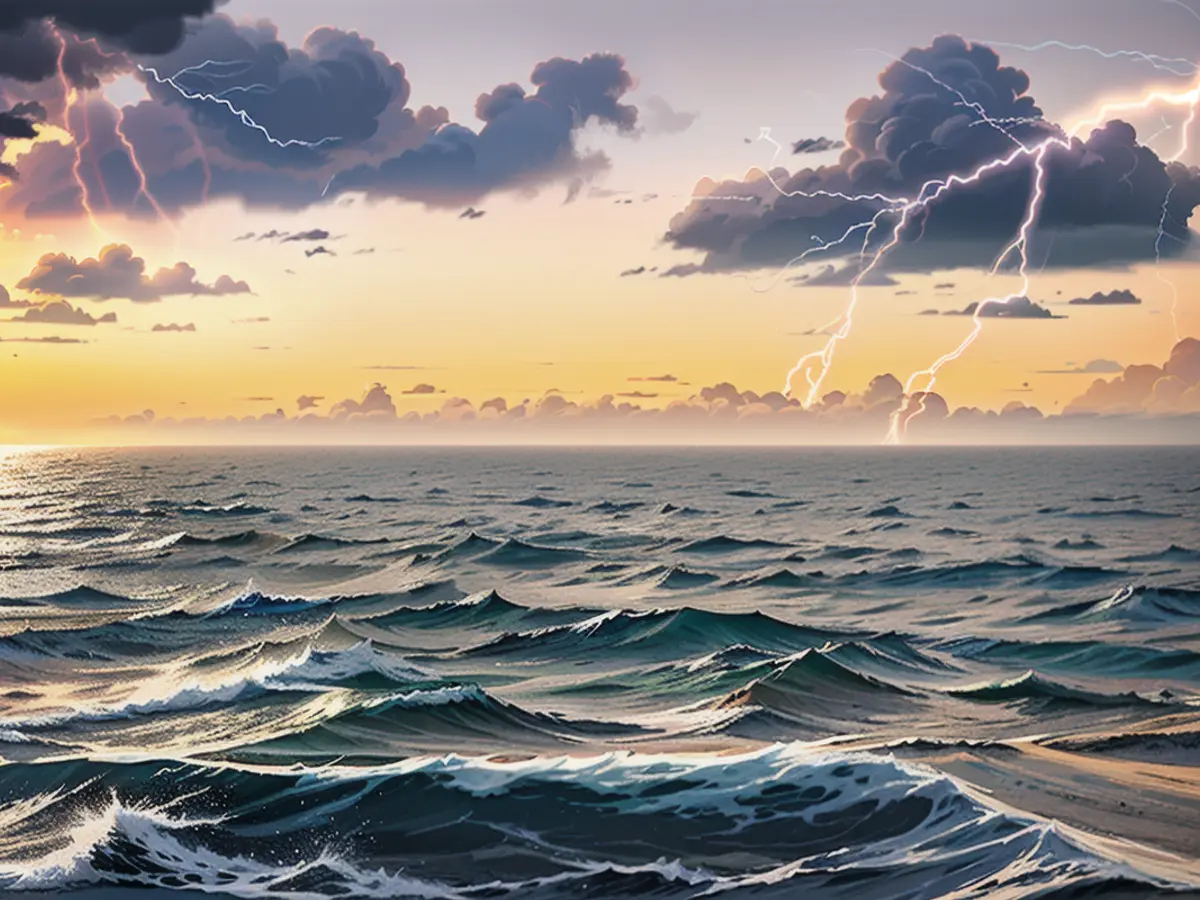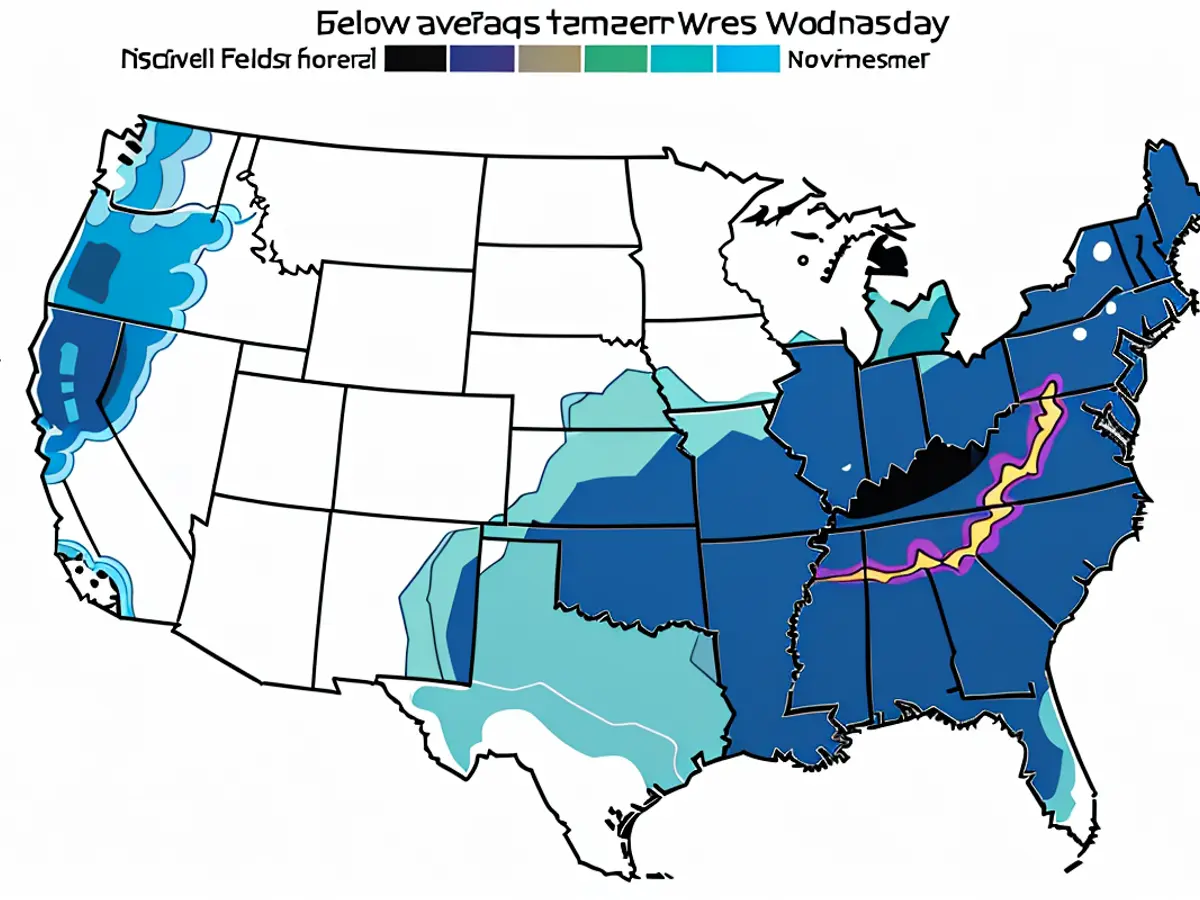Inquiries and Responses - Is the increase in ocean temperatures causing Europe's extreme weather events?
## The Rising Temperatures of the World's Oceans: A Complicated Story
Several factors are believed to be causing the increase in ocean temperatures, but there's no definitive answer yet. "Our Earth is witnessing a combination of natural changes and human-induced climate change," explains Stephanie Fiedler, Head of the Marine Meteorology Research Unit at the Helmholtz Center for Ocean Research in Kiel (Geomar) who researches these topics. Due to the release of greenhouse gases, global surface temperatures, including those of the oceans, are rising. According to the World Meteorological Organization's (WMO) Climate Status Report, some areas have recently experienced extreme heatwaves with sudden temperature spikes.
Natural weather events like the transition between La Niña and El Niño also have an influence on ocean temperatures.
The Effects of El Niño
El Niño has the most impact where it occurs. "For instance, precipitation patterns change, resulting in more rain in South America and lesser rainfall in Southeast Asia and Australia," says climate scientist Fiedler. In the Atlantic, the effects of El Niño are less noticeable due to the ocean's geographical distance.
The Role of El Niño in Ocean Warming
Fiedler emphasizes that natural phenomena have the most noticeable effects where they happen. "El Niño causes significant impacts in Latin America, including changes in rainfall patterns, leading to more rainfall in South America and less in Southeast Asia and Australia," she explains. However, in the Atlantic, the effects are less noticeable due to the vast distance from the Eastern Pacific coast of Peru.
Why Is the Atlantic Warming Faster Than Other Oceans?
Researchers are currently working to understand this. A few factors that contribute to the Atlantic's rising temperatures include human-induced climate change and changes in ocean circulation patterns. "Just like high and low-pressure systems determine our weather, ocean currents also influence ocean temperatures," says Fiedler from Geomar.
The Impact of Warmer Ocean Water on Europe's Weather
Warmer ocean surface temperatures lead to more evaporation and higher humidity levels in the atmosphere. This can cause more extreme rainfall events in Europe. "However, it's important to note that each extreme event can't be solely attributed to higher ocean surface temperatures," reminds Fiedler. Weather conditions like the development of high and low-pressure systems also play a role.
When Will the Oceans Cool Down?
It's hard to say precisely when the oceans will cool down. Scientists believe the warming trend will continue with some fluctuations. "We're in a period of rising temperatures, but there will inevitably be ups and downs," says Fiedler. "The climate system is complicated and heavily influenced by various factors."
What Happens When Ocean Temperatures Cool?
When ocean temperatures decrease, the amount of water vapor in the air also lessens, potentially leading to drier conditions in certain areas. "Research is ongoing to understand these impacts," says Fiedler. "The climate system is complex and influenced by many factors."
The Connection Between Ocean Temperatures and Climate Change
The current knowledge suggests that both drought and heavy rain will become more frequent and more extreme with rising temperatures. "In the Mediterranean region, for example, it's expected to be drier on average, while it will be wetter in northern Europe," summarizes Fiedler. However, she stresses, "This doesn't mean that extreme rainfall events will no longer occur in Mediterranean regions."
Predicting Future Ocean Temperatures
Unfortunately, there's no way to know exactly when the oceans will cool down again. Fiedler points out that natural phenomena like El Niño and La Niña occur in cycles, lasting about seven and two years, respectively. However, there are no reliable predictions for future temperature changes in the oceans. "The further away you look into the future, the more uncertain the forecasts become," she adds.
The Consequences of Cooler Ocean Temperatures
"Reduced water vapor in the atmosphere could mean fewer extreme rainfall events," theorizes Fiedler. "But it's not that simple because natural water and air currents continue to drive the weather," she continues. For example, if El Niño is replaced by La Niña, less rain would fall in South America, and more rain would fall in Australia. "The weather is regional, complex, and influenced by many factors."
Fiedler anticipates that ocean temperatures will continue to rise overall. With oceans being able to store vast amounts of heat and carbon dioxide, it's estimated that it would take several hundred years for the full impact of temperature changes in the oceans to be felt. "Pessimistic predictions suggest that ocean warming may continue even if climate goals are met and maintained," she says.

Read also:
- Rain expected again: The situation in the flood areas remains threatening
- Continuous rain until Thursday: Concerns about collapsing dykes are growing in the flood areas
- Flood situation remains tense - more rain forecast
- Flood situation remains tense - weir on the Elbe is opened
- Despite the ongoing climate change, some areas in Europe have been experiencing drought, highlighting the complexity of the relationship between ocean temperatures and extreme weather events.
- The recent temperature record in the Atlantic Ocean, which reached unprecedented highs in April, has raised concerns about the potential impact on extreme weather events in regions like Europe.
- South America, which is often affected by El Niño, has experienced more frequent and extreme floods as a result of the warmer Pacific Ocean temperatures.
- The Pacific Ocean, not just the Atlantic, plays a significant role in climate change, as warmer temperatures can lead to more extreme weather events, including floods and heavy rainfall, in various parts of the world.
- Climate change and extreme weather events, such as droughts and floods, are causing weather chaos in different parts of the world, including Europe and South America, emphasizing the urgent need for action to mitigate the effects of climate change.
Source:








